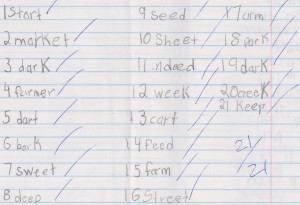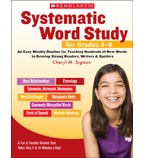Making words powerful – replacing a traditional spelling program
 When I was in elementary school, spelling programs were a large part of our Language Arts lessons each week. On Mondays, we would do a pretest, mark it, correct it, and write out each of the words. In the next few days, we would complete numerous activities, including writing each word in a sentence, doing the dictionary definitions, perhaps a crossword, and filling in the blanks using the correct word. On Fridays, we had our test. It was on long, skinny, full scrap paper. The next week, we would begin the entire process again with new words. I’m not certain that any of us could necessarily spell these words correctly from then on, but we definitely knew them for Friday’s test.
When I was in elementary school, spelling programs were a large part of our Language Arts lessons each week. On Mondays, we would do a pretest, mark it, correct it, and write out each of the words. In the next few days, we would complete numerous activities, including writing each word in a sentence, doing the dictionary definitions, perhaps a crossword, and filling in the blanks using the correct word. On Fridays, we had our test. It was on long, skinny, full scrap paper. The next week, we would begin the entire process again with new words. I’m not certain that any of us could necessarily spell these words correctly from then on, but we definitely knew them for Friday’s test.
For the past several years, I’ve avoided this traditional type of program. I believe it has valuable components, such as understanding the meaning of words, being able to use it in the right context, and improving our ability to learn how the word is created between the pre and post tests. What I worry about though, is whether there is a connection between learning how to spell in this fashion and improving your oral, written, and reading vocabulary. Does rote memorization of word lists truly impact a child’s reading and writing? I think the answer is both yes and no.
What I do believe, is that there is a connection between a child`s understanding of how words are made up and their ability to decode, read, and comprehend. I am a big fan of the activities that come along with Word Work and think they are important to retaining vowel sounds, word chunks, understanding of syllables, and knowledge of prefixes and suffixes. I use the term Word Work, both here and at school, in place of the word Spelling. It is more than spelling a word correctly that I am after.
Powerful readers make connections and I think that students need to connect the words they are learning to what they are reading and writing. While many spelling programs offer word lists that compliment the curriculum, I think that the important feature is that the activities that students engage in must help them further understand the word. They need to be able to see and understand the letters, sounds, parts, and the whole. They need to understand it in context and out. They need to recognize small pieces of words so they can identify sound patterns. This means going beyond rote memorization of word lists.
Having said that, in the early grades, memorization of Sight Words (they may be called Dolch, Primer, No Excuse, or Red words) is a building block to reading success. These words don’t conform to the conventions that we teach. Using rote memorization in combination with “spelling” and writing activities is a great way to reinforce these unconventional words that are such a huge part of our oral and written vocabulary.
 As we move up through the grades and try to move toward reading for understanding, the students need to extend and strengthen these skills. Programs such as Rewards, Words Their Way, or Making Words are great ways to get students to extend and strengthen their word recognition abilities. I have been using a new book that I recently purchased from Scholastic, called Systematic Word Study. It’s a sequential, daily word program that highlights prefixes, suffixes, meaning, parts, antonymns, and syllables. The more kids understand how to break these words apart, categorize them, put them back together, or see them in different ways, the better chance we have at them transfering this recognition to their writing and reading. The best part of this program is that it is fun. It’s got really great activities, such as building mystery words using parts of other words, that the kids get really involved in. The activities are short, specific, and powerful.
As we move up through the grades and try to move toward reading for understanding, the students need to extend and strengthen these skills. Programs such as Rewards, Words Their Way, or Making Words are great ways to get students to extend and strengthen their word recognition abilities. I have been using a new book that I recently purchased from Scholastic, called Systematic Word Study. It’s a sequential, daily word program that highlights prefixes, suffixes, meaning, parts, antonymns, and syllables. The more kids understand how to break these words apart, categorize them, put them back together, or see them in different ways, the better chance we have at them transfering this recognition to their writing and reading. The best part of this program is that it is fun. It’s got really great activities, such as building mystery words using parts of other words, that the kids get really involved in. The activities are short, specific, and powerful.
So while I don’t think that the spelling programs of my youth are what we need to boost strugging and proficient learners, I do recognize the value in Word Work. The more connections and transfer skills that we can arm our students with, the greater chance they have for success in all curricular areas.
Systematic Word Study For Grades 4-6 at Amazon.ca








































Jody,
You are so right about this. I searched my house to find a sample to use as an illustration. Unfortunately, I did not find the long, skinny sheet of paper (with a seasonal sticker on top). This authentic, grade three spelling test was the best I could do! I always enjoy your insight. Thank you for reframing “spelling” to “word work” and encouraging us to think differently about this.
Carolyn